Trump impeachment trial: Senate rejects Democrats’ effort to subpoena witnesses, documents
-Heated arguments over Senate rules resolution that now calls for 24 hours of arguments over three — not two — days after GOP’s Collins objects
-McConnell, in opening remarks, says, ‘finally, some fairness’
-House managers complain about proposed trial rules, claiming McConnell is orchestrating a cover-up
-On party-line votes, Senate rejects Schumer amendments to subpoena White House, State Department, OMB for witnesses and documents
This is how the day unfolded.
7:24 p.m. GOP-controlled Senate rejects Democrats’ effort to subpoena OMB records
McConnell calls for a vote to table, or set aside, Schumer’s amendment calling for the Senate to subpoena the Office of Management and Budget for documents related to the military aid to Ukraine.
The amendment is killed 53-47 along strict party lines — just as happened with the two previous Democratic amendments.
Schumer announces a fourth amendment — to subpoena testimony from acting White House Chief of Staff Mick Mulvaney.
With it still unclear how many more amendments Democrats might offer — and how many more hours of debate that might mean — the Senate then breaks for dinner.
As GOP senators leave the chamber — many grabbing phones and furiously typing on their electronics — they’re huddling just off the floor to enjoy a dinner of — pizza.
7:10 p.m. A long day for senators, stuck in seats, listening to hours of arguments
The first long day of the president’s impeachment trial has taken its toll on senators, who have been forced to sit in silence, relying on water and snacks to sustain them through hours of debate over the resolution setting the parameters for the impeachment trial.
The first person caught dozing was Republican Sen. Jim Risch of Idaho.
At about 5:30 p.m., as Rep. Val Demings, D-Fla., spoke in favor of an amendment to subpoena the State Department for records, Risch was slumped over with his head resting in his right hand, and appeared to be sleeping or close to it, though he stirred repeatedly to rub his eyes.
Risch perked up later as Jay Sekulow, a lawyer for President Trump, and Rep. Adam Schiff, the lead impeachment manager, took to the floor following Demings.
“What time is it?” Risch could be heard asking when Schiff appeared to run over the time allotted for the managers. He then started tapping the face of his wristwatch, which echoed through the chamber.
Other senators relied on gum and mints to stay alert. GOP Sen. Tim Scott of South Carolina was seen popping a mint into his mouth at about 6:10 p.m. Democratic Sen. Ron Wyden of Oregon was seen chewing on his pen.
The Senate is expected to break for dinner between 8 and 9 p.m. ET after a vote to table the Democrats’ third amendment, which seeks to subpoena the Office of Management and Budget for records.
— ABC’s Benjamin Siegel
7:04 p.m. Sekulow argues Ukraine aid ultimately delivered without investigation announcement
The president’s personal attorney and part of his defense team Jay Sekulow repeated arguments from Republicans that the Trump administration ultimately provided aid to Ukraine that was authorized by Congress and went further than aid provided by the Obama administration.
Sekulow said that the fact that the aid was ultimately provided without an announcement of an investigation into the Bidens or Burisma undercuts the Democrats’ argument that President Trump held back the money for his own political benefit.
6:39 p.m. House manager Jason Crow argues OMB documents would show President Trump used national defense funds for his political benefit
House manager Jason Crow begins his argument in favor of the amendment to subpoena the Office of Management and Budget by sharing some of his personal history as an Army Ranger serving in Afghanistan and Iraq.
Crow is in his first term in Congress and served in the 82nd Airborne Division before joining the 75th Ranger Regiment, with which he served two tours in Afghanistan as part of the Joint Special Operations Task Force.
He says the decision to withhold military aid from Ukraine was “personal” to him and that OMB played a key role in the decisions to hold back aid approved by Congress.
“These documents would provide insight into critical aspects of the military-aid hold. They would show the decision-making process and motivations behind President Trump’s freeze. They would reveal the concerns expressed by career OMB officials including lawyers that the hold was violating the law. They would expose the lengths to which OMB went to justify the president’s hold,” he says.
“They would reveal concerns about the impact of the freeze on Ukraine and U.S. national security. They would show senior officials repeatedly attempted to convince President Trump to release the hold. In short, they would show exactly how the president carried out the scheme to use our national defense funds to benefit his personal political campaign,” Crow says.
6:20 p.m. Senate rejects second Democratic amendment, for State Department documents, also along party lines
Schiff appeals directly to the senators sitting silently in the chamber in his argument that they should vote to subpoena the State Department for additional evidence in the impeachment trial.
“You’re going to have 16 hours to ask questions. Sixteen hours — that’s a long time to ask questions. Wouldn’t you like to be able to ask about the documents during those 16 hours?”
Schiff references the “three amigos,” three administration officials who took the lead in the administration’s policy in Ukraine.
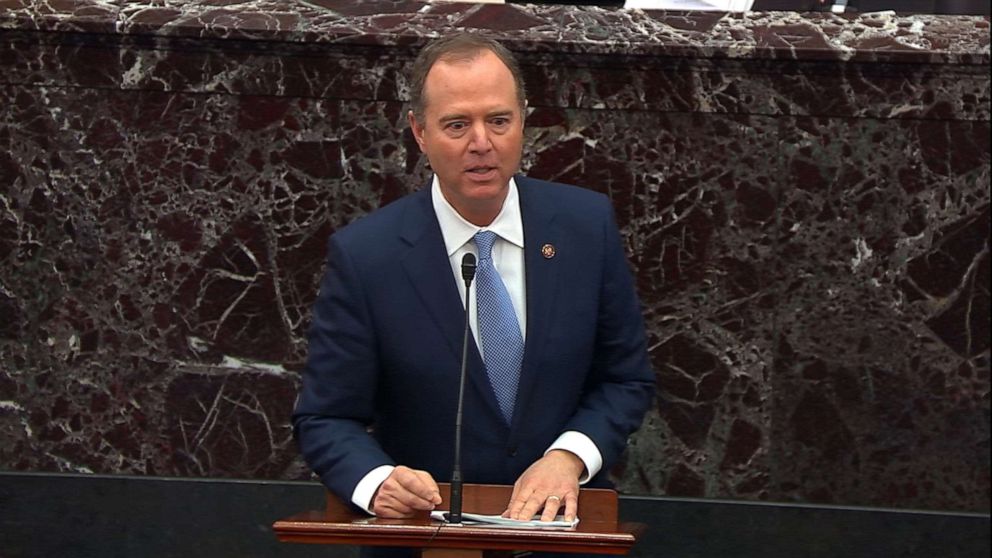
Adam Schiff speaks on the Senate floor during the impeachment trial of President Donald Trump, Jan. 21, 2020, in Washington, DC.ABC News
Although Ambassadors Kurt Volker and Gordon Sondland both testified as part of the House impeachment inquiry, Schiff pointed out that the third “amigo” – former Energy Secretary Rick Perry – has thus far refused to cooperate with investigators or provide any documents.
“Wouldn’t you like to know? Don’t you think the American people have a right to know what the third Amigo knew about this scheme?” Schiff asks.
McConnell calls for a vote to table Schumer’s second amendment, calling for the Senate to subpoena the State Department for documents related to the administration’s involvement in Ukraine and the decision to withhold military aid. That amendment is tabled — or killed– along party lines, just his first one calling for White House witnesses was rejected.
Schumer then offers a third amendment to subpoena the Office of Management and Budget for documents.
Some color from our reporters inside the chamber watching from above in the press gallery:
During the defense’s statements, the most aggressive Republican note-takers were GOP Sens. Murkowski and Collins (two of the four Republicans we are watching closely). The two women wrote for multiple minutes as White House counsel Pat Cipollone spoke.
A few aides have been walking on and off the floor to deliver notes to members, who for the most part remain quiet and attentive.
Also coming on and off the floor – Senate pages who have been vigorously delivering water glasses to both the House legal team and the members over the last few minutes.
— ABC’s Allison Pecorin
6:05 p.m. Chief Justice John Roberts has to be back at his first job tomorrow morning
Even as it’s unclear how much longer the Senate will go tonight debating Democratic amendments, one of the few people in the chamber who will have to be back at work first thing tomorrow morning — running an entire branch of government — is the chief justice.
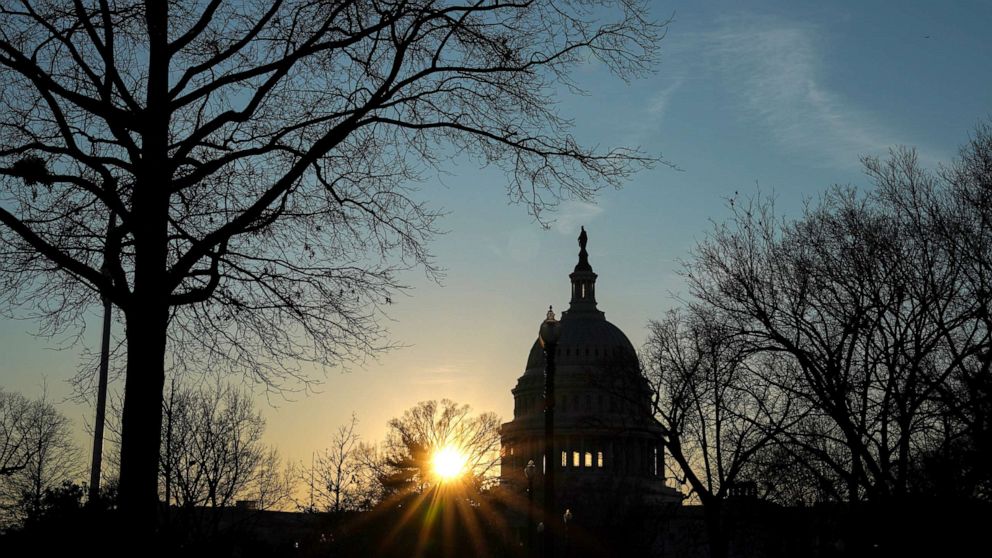
The U.S. Capitol building exterior is seen at sunset, Jan. 21, 2020, in Washington, DC.Sarah Silbiger/Reuters
He’ll preside over oral arguments at the Supreme Court in a major case involving religion and school choice that public school unions say is “crucial” for their funding. That begins at 10 a.m.
The senators and other staff presumably won’t be back in business until midday when the trial’s opening arguments are expected to begin at 1 p.m. and Roberts will need to be back on the Senate dais as presiding officer.
— ABC’s Devin Dwyer
5:20 p.m. Democratic Rep. Val Demings argues Senate must subpoena State Department documents
House manager Val Demings is now making an argument in favor of an amendment to subpoena to State Department for documents related to Ukraine.
Demings, 62, made an impression in questioning witnesses when the testified before both the House Intelligence and Judiciary Committees.
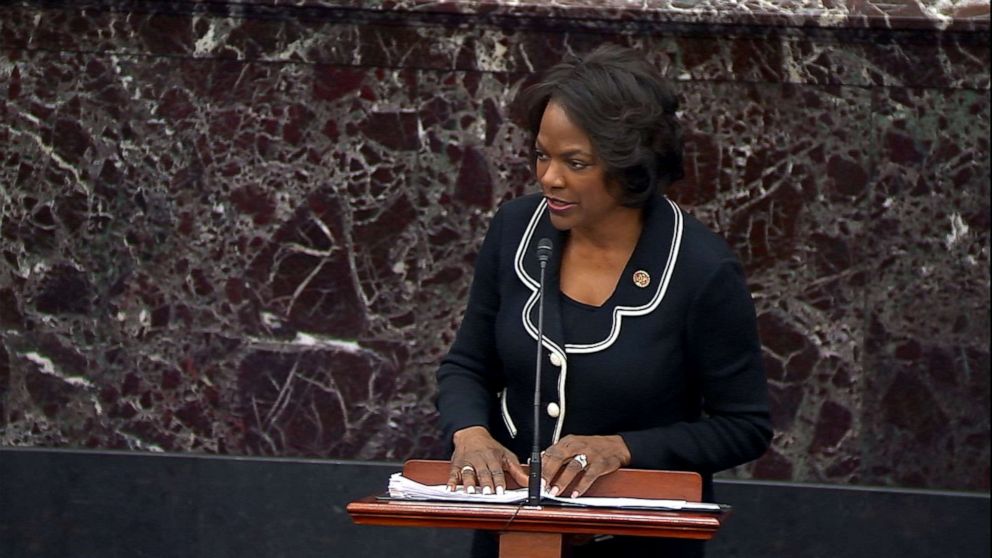
Val Demings speaks on the Senate floor during the impeachment trial of President Donald Trump, Jan. 21, 2020, in Washington, DC.ABC News
Unlike the other House managers, Demings doesn’t have a background as a litigator but she did work in the criminal justice system as the first female police chief in the Orlando Police Department, where she served for 27 years.
A Florida State University and Webster University graduate, Demings is the only member of the managing team without a law degree and the only member with a law enforcement background.
– ABC’s Ben Siegel
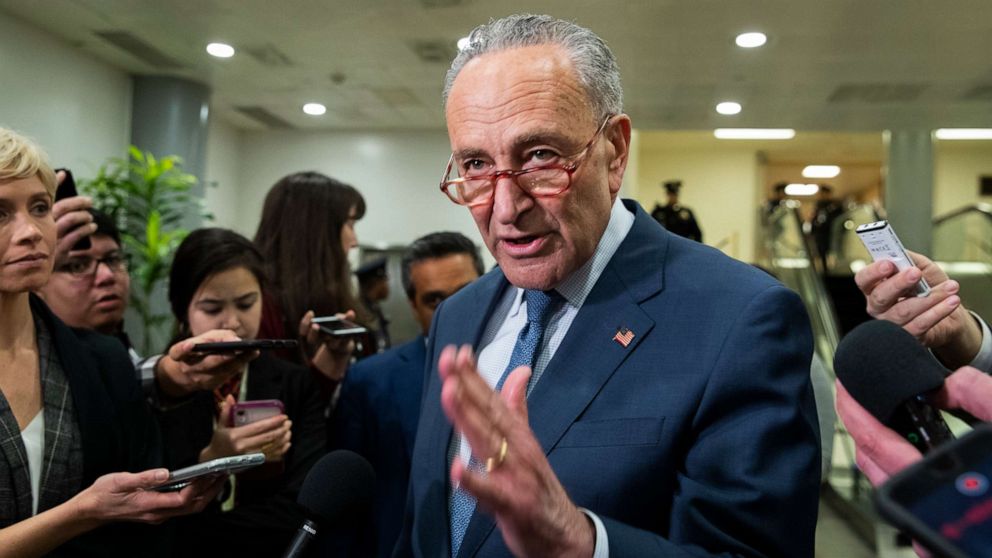
Sen. Chuck Schumer speaks to reporters during a brief recess on the first full day of the impeachment trial of President Donald Trump, on Capitol Hill in Washington, Jan. 21, 2020.Manuel Balce Ceneta/AP
4:40 p.m. Senate rejects Schumer amendment calling for a subpoena for White House witnesses and documents
On a party-line vote, 53-47, the Senate votes to put aside — or kill — Schumer’s amendment to subpoena witnesses and documents from the White House.
Schumer proposes a new amendment to subpoena documents from the State Department related to calls between President Trump and Ukrainian President Zelenskiy.
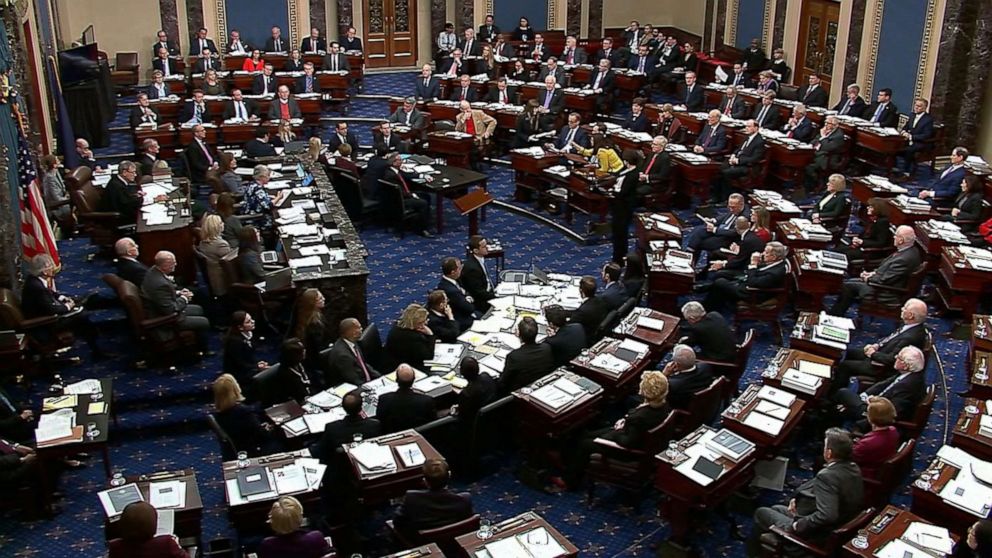
The Senate Chamber as members vote on the amendment offered by Senate Minority Leader Chuck Schumer in the impeachment trial against President Donald Trump, Jan. 21, 2020, at the U.S. Capitol in Washington, D.C.ABC News
There will be another two hours of debate on that amendment. McConnell says he will move to table that amendment as well.
4:14 p.m. Trump’s lawyers argue all the Democrats’ subpoenas have been invalid
Patrick Philbin, one of the lawyers on President Trump’s defense team, pushes back on the Democrats’ argument that the White House refused to cooperate with the inquiry.
He says the White House did respond to subpoena requests with a letter laying out why it saw the subpoenas were invalid – primarily that the House had not voted to authorize an official impeachment inquiry.
“All of those subpoenas were invalid,” he says.
“And that was explained to the House, to manager Schiff and the other chairman of the committees at the time in that October 18th letter. Did the House take any steps to remedy that? Did they try to dispute that? Did they go to court? Did they do anything to resolve that problem? No.”
After Philbin finishes, Schiff speaks again.
“Let’s get this trial started, shall we?” Schiff says in response to the president’s lawyers’ claim that Democrats are pushing for more evidence because the House’s case isn’t strong enough.
“We are ready to present our case. We are ready to call our witnesses. The question is will you let us?” he asks.
As arguments conclude, McConnell makes a motion to put Schumer’s amendment aside.
3:42 p.m. Former GOP Sen. Jeff Flake watches from Senate Gallery
Former Sen. Jeff Flake is in the chamber. He is seated in the upper level that is reserved for staff and guests. He looked over to the press area where reporters are seated and smiled.
The former senator and fierce Trump critic announced in 2017 that he would not seek reelection.
Flake notably has said that if the Senate held a secret ballot to remove Trump from office, more than 30 Republicans would vote to oust him.
3:34 p.m. House manager Zoe Lofgren says documents Democrats want subpoenaed would reveal ‘the truth’
House manager Zoe Lofgren argues Schumer’s amendment to subpoena key evidence from the White House would circumvent President Trump’s efforts to block the House impeachment investigation by refusing to release documents or blocking officials from cooperating.
She says evidence released through Freedom of Information Act requests and messages from Ruddy Giuliani associate Lev Parnas made public after the House impeachment vote show that the White House documents could further implicate the president in wrongdoing concerning the withheld aid to Ukraine.
“The documents include records of the people who may have objected to this scheme, such as Ambassador (John) Bolton. This is an important impeachment case against the president. The most important documents are going to be at the White House. The documents Senator Schumer’s amendment targets would provide clarity and context about president Trump’s scheme,” Lofgren says.
“We don’t know with certainty what the documents will say. We simply want the truth … whatever that truth may be. So, so do the American people. They want to know the truth. And so should everybody in this chamber regardless of our party affiliation,” she adds.
Lofgren points out that multiple witnesses in the House investigation testified they took detailed, handwritten notes around relevant events like the July 25 call between Trump and Ukrainian President Zelenskiy.
She says documents like those notes would provide a first-hand look at how Trump’s behavior was perceived by those around him at the time.
3:26 p.m. Schiff argues the president’s lawyers didn’t even mention the rules resolution
After the break, Schiff pushes back on accusations from the president’s lawyers that the House impeachment proceedings were unfair and that Republicans and representatives of the president weren’t allowed to participate. He says it is “just plain wrong” to say Republicans weren’t allowed in the depositions with witnesses or that the president wasn’t allowed to send a representative to Judiciary Committee proceedings.
“I’m not going to suggest to you they are being deliberately misleading here, but it is just plain wrong. You have also heard my friends at the other table make attacks on me and chairman Nadler. You will hear more of that. I am not going to do them the dignity of responding to them, but I will say this. They make a very important point, although it’s not the point I think they’re trying to make,” Schiff said.
“When you hear them attack the House managers, what you are really hearing is “we don’t want to talk about the president’s guilt. We don’t want to talk about the McConnell resolution and how patently unfair it is.”
2:55 p.m. Inside the Senate chamber, senators taking notes, exchanging messages
As the Senate took a break, ABC’s Mariam Khan reports senators, for the most part, were sitting quietly at their desks while Cipollone, Sekulow, and Schiff took turns speaking.
Senators seem to be paying close attention, maintaining eye contact with the speakers, and taking notes.
As Schiff spoke about the charges against the president, Trump’s key allies – GOP Sens. Lindsey Graham, David Perdue, Jim Risch, James Inhofe, and several others, stared stoically ahead.
Moderate GOP Sens. Susan Collins and Lisa Murkowski — who are seated next to each other — are taking copious amounts of notes, their faces expressionless.
While Schiff was speaking, Graham started to look a little bored, shifting in his seat constantly. While senators cannot speak to one another during the proceedings, he scribbled out a note on his legal notepad and shared it with his seatmate, Sen. John Barrasso.
Barrasso read the note, exchanged a knowing look with Graham and the two quietly chuckled.
When Schiff went on about the need for witnesses, Graham appeared to smirk.
When Schiff played a video of Trump saying he wanted to hear from witnesses – Minority Leader Schumer began to grin widely. He looked pleased.
Meanwhile, senators are still getting messages from the outside world. Aides are discreetly walking on to the floor to hand-deliver paper messages to senators. Senate pages are walking around filling up water glasses.
2:39 p.m. President Trump’s lawyers argue the Democrats failed to pursue their case in the courts
President Trump’s personal attorney Jay Sekulow begins his argument by slamming the process in the House impeachment inquiry.
“And what we just heard from manager Schiff, courts have no role, privileges don’t apply, what happened in the past we should just ignore. In fact, manager Schiff just said try to summarize my colleagues’ defense of the president,” Sekulow says.
“He said not in those words of course, which is not the first time Mr. Schiff has put words into transcripts that did not exist. Mr. Schiff also talked about a trifecta,” Sekulow says.
“I’ll give you a trifecta. During the proceedings that took place before the Judiciary Committee, the president was denied the right to cross-examine witnesses. The president was denied the right to access evidence. And the president was denied the right to have counsel present at hearings. This is a trifecta that violates the Constitution of the United States. Mr. Schiff did say the courts really don’t have a role in this. Executive privilege, why would that matter? It matters because it is based on the Constitution of the United States,” Sekulow continues.
The president and his counsel could not participate in person during the depositions that House Intelligence, Judiciary, and Oversight committees held but once the hearings moved to the House Judiciary Committee, the White House and the president chose not to participate even though they were invited to present a defense.
Pat Cipollone also says that Schiff was keeping Republicans out of the impeachment depositions. That is not true. Republicans on the committees mentioned participated in the depositions.
Sekulow argues that the only reason we are here is because Democrats want the president removed from office.
“What are we dealing with here? Why are we here? Are we here because of a phone call? Or are we before a great body because, since the president was sworn into office, there was a desire to see him removed.”
He says that House Speaker Nancy Pelosi expressed her impatience and contempt for the proceedings and waiting for the courts to rule when she said: “we cannot be at the mercy of the courts.”
“That is why we have courts … to determine constitutional issues of this magnitude,” he said, although it should be noted that the administration has argued that the courts should not have a role here,” he says.
-ABC’s Katherine Faulders
Trump attorney Jay Sekulow: “Why are we here? Are we here because of a phone call? Or are we here, before this great body, because since the president was sworn into office there was a desire to see him removed?”
2:13 p.m. GOP’s Collins pressed to have arguments take place over 3 — not 2 — days
ABC’s Trish Turner on Capitol Hill reports aides to moderate GOP Sen. Susan Collins say she and others raised concerns about trying to fit the 24 hours of opening statements in two days under the proposed rules and the admission of the House transcript of the evidence into the Senate record.
Her position has been that the trial should follow the Clinton model as much as possible, the aides say. She thinks these changes are a significant improvement, they say.
Later, during a break, a Republican senator – who asked not to be quoted – said the discussion of the tweaks to McConnell resolution was the topic of discussion at the GOP lunch today.
Some of the key senators, like Collins, “were clearly concerned about the topics around which changes were made,” this senator said, reports ABC’s Trish Turner.
”It was clear there was quite a bit of concern,” so it was changed, the senator said.
Sen. Ron Johnson said, “There was pretty strong feeling which is why it got changed,” saying the concern extended even beyond moderate senators. Republicans wanted to take an argument away from Schumer, he said. “We are not trying to hide testimony in the wee hours of the morning.”
2:08 p.m. Trump tweets from Switzerland
President Trump appears to be monitoring the Senate trial from his trip to Davos, Switzerland, to attend the World Economic Forum, reports ABC’s Elizabeth Thomas.
A few minutes after he left a dinner with Global Chief Executive Officers, the last scheduled event of the day in Davos, Trump tweeted, “READ THE TRANSCRIPTS!” — one of his favorite defenses, as he has often said before, referring to his calls with Ukraine’s president — calls which he calls “perfect.”
1:34 p.m. Schiff says Trump is arguing there is nothing Congress can do about his conduct
House Intelligence Chairman Adam Schiff makes his first remarks in Tuesday’s session, speaking on behalf of the House impeachment managers against McConnell’s resolution.
He says Trump is arguing that there is nothing Congress can do about the behavior in question in the trial and the trial won’t be fair if both sides are blocked from introducing new evidence.
“If a president can obstruct his own investigation, if he can effectively nullify a power, the Constitution gives solely to Congress and indeed the ultimate power, the ultimate power the Constitution gives to prevent presidential misconduct, then the president places himself beyond accountability, above the law,” Schiff says.
“It makes him a monarch, the very evil which against our Constitution and the balance of powers the Constitution was laid out to guard against,” he says.
Rep. Adam Schiff: “It is the president’s apparent belief that under Article 2 he can do anything he wants — no matter how corrupt .. and yet when the Founders wrote the impeachment clause, they had precisely this type of conduct in mind.”
2:13 p.m. GOP’s Collins pressed to have arguments take place over 3 — not 2 — days
ABC’s Trish Turner on Capitol Hill reports aides to moderate GOP Sen. Susan Collins say she and others raised concerns about trying to fit the 24 hours of opening statements in two days under the proposed rules and the admission of the House transcript of the evidence into the Senate record.
Her position has been that the trial should follow the Clinton model as much as possible, the aides say. She thinks these changes are a significant improvement, they say.
Later, during a break, a Republican senator – who asked not to be quoted – said the discussion of the tweaks to McConnell resolution was the topic of discussion at the GOP lunch today.
Some of the key senators, like Collins, “were clearly concerned about the topics around which changes were made,” this senator said, reports ABC’s Trish Turner.
”It was clear there was quite a bit of concern,” so it was changed, the senator said.
Sen. Ron Johnson said, “There was pretty strong feeling which is why it got changed,” saying the concern extended even beyond moderate senators. Republicans wanted to take an argument away from Schumer, he said. “We are not trying to hide testimony in the wee hours of the morning.”
2:08 p.m. Trump tweets from Switzerland
President Trump appears to be monitoring the Senate trial from his trip to Davos, Switzerland, to attend the World Economic Forum, reports ABC’s Elizabeth Thomas.
A few minutes after he left a dinner with Global Chief Executive Officers, the last scheduled event of the day in Davos, Trump tweeted, “READ THE TRANSCRIPTS!” — one of his favorite defenses, as he has often said before, referring to his calls with Ukraine’s president — calls which he calls “perfect.”
READ THE TRANSCRIPTS!
1:34 p.m. Schiff says Trump is arguing there is nothing Congress can do about his conduct
House Intelligence Chairman Adam Schiff makes his first remarks in Tuesday’s session, speaking on behalf of the House impeachment managers against McConnell’s resolution.
He says Trump is arguing that there is nothing Congress can do about the behavior in question in the trial and the trial won’t be fair if both sides are blocked from introducing new evidence.
“If a president can obstruct his own investigation, if he can effectively nullify a power, the Constitution gives solely to Congress and indeed the ultimate power, the ultimate power the Constitution gives to prevent presidential misconduct, then the president places himself beyond accountability, above the law,” Schiff says.
“It makes him a monarch, the very evil which against our Constitution and the balance of powers the Constitution was laid out to guard against,” he says.

